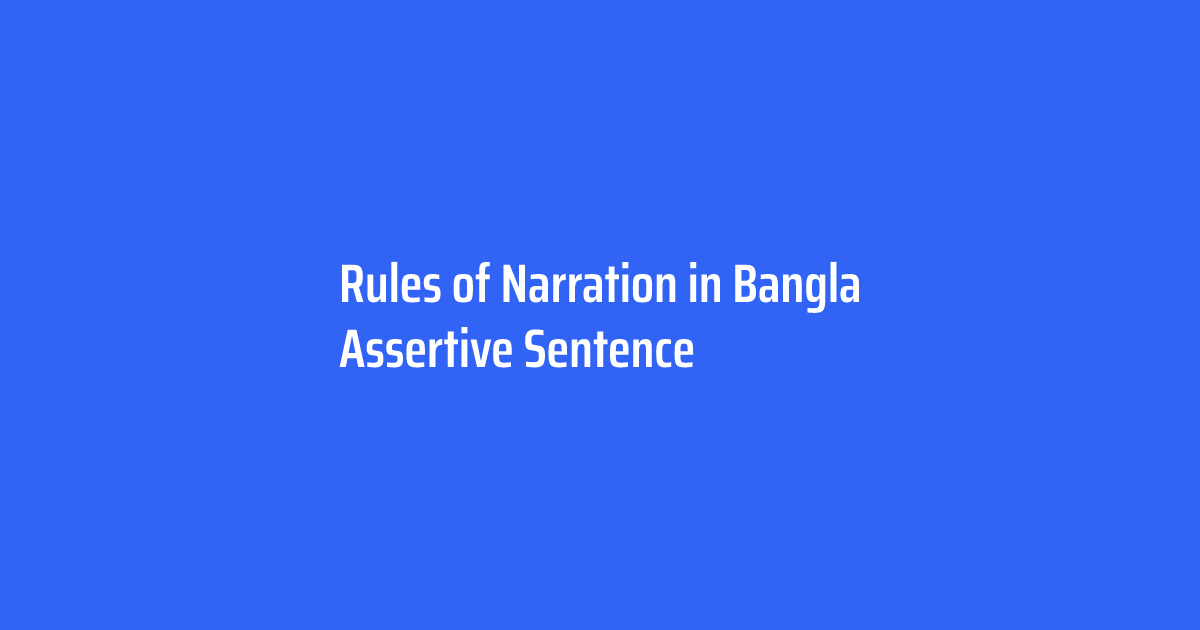Rules of Narration in Bangla, বাংলাতে Narration এর Rules জানতে চাচ্ছেন? আজকের আর্টিকেলে Assertive Sentence এর ন্যারেশন পরিবর্তন এর রুলস গুলো শেয়ার করা হয়েছে। ধারাবাহিক ভাবে আমরা ন্যারেশনের সব রুলস শেয়ার করবো।
Narrate অর্থ বর্ণনা করা। কোন বক্তার বক্তব্য অপর কোন ব্যক্তি যখন Narrate বা বর্ণনা করে তখন ব্যাকরণের কতকগুলি নিয়ম-কানুন মানিয়া তাহা করিতে হয়। এইরূপ বর্ণনা করার কাজকেই Narration বলা হয়। অর্থাৎ বক্তা যাহা বলে তাহাই Speech বা Narration।
Narration দুই প্রকার।
Direct Narration (প্রত্যক্ষ উক্তি)
Indirect Narration (পরোক্ষ উক্তি)
Rules of Narration in Bangla (Assertive Sentence)
1. Direct Speech- কে Indirect Speech- এ পরিবর্তন করিবার সময় Inverted Comma (ইনভারটেড কমা) উঠাইয়া that বসাইতে হয়।
2. (a) Reported Speech-এর কর্তা যদি 1st Person হয়, তবে Subject-এর Person অনুযায়ী তাহা পরিবর্তন করিতে হইবে । যথাঃ
EXAMPLE:
Direct: He said to me. “I am ill.”
Indirect: He told (said to) me that he was ill.
(b). Reported Speech-এর কর্তা যদি 2nd Person হয়, তবে বাহিরের Object- এর Person অনুযায়ী পরিবর্তন করিতে হইবে। যথাঃ
EXAMPLE:
Direct- You said to me. “You are ill.”
Indirect- You said to me that I was ill.
(c). Reported Speech-এর কর্তা যদি 2nd Person হয় এবং বাহিরে object না থাকে, তবে উক্ত কর্তাকে পরিবর্তন করিয়া 3rd Person করা হয়।
(d). Reported Speech-এর কর্তা যদি 3rd Person হয়, তবে উহার কোনই পরিবর্তন হইবে না । যথাঃ
EXAMPLE:
Direct- He said. “Rahim is ill”
Indirect- He said that Rahim was ill.
3. (a) Reporting Verb টি Past Tense হইলে পরিবর্তনের সময় Reported Speech-এর Verb ও (Tense অনুসারে) Past Tense হইবে । যথাঃ
EXAMPLE:
Direct- He said. “I am ill.”
Indirect- He said that he was ill.
(b). Reporting Verb যদি Present বা Future Tense হয়, তবে Reported Speech-এর Verb-এর কোন পরিবর্তন হয় না, যে Tense সেই Tense ই থাকিবে ।
4. Reporting Verb টি Past Tense এবং Reported Speech টি যদি Past Indefinite Tense (কতার পরে মূল verb Past Tense) হয়, তবে পরিবর্তনের সময় সাহায্যকারী verb ‘had’ বসিবে এবং মূল Verb-এর Past Participle হইবে অর্থাৎ বাক্যটি Past Perfect Tense-এ পরিণত হইবে।
5. যদি Reporting Verb টি Past Tense এবং Reported Speech টি Past Continuous Tense (কর্তার পরে সাহায্যকারী Verb ‘was’ বা ‘were’ এবং মূল Verb-এর সহিত ‘ing’ যুক্ত থাকিবে), তবে পরিবর্তনের সময় was/were উঠাইয়া দিয়া ‘had been’ বসাইতে হইবে । অর্থাৎ বাক্যটিকে Past Perfect Continuous Tense- এ পরিণত করিতে হইবে।
6. Reporting Verb টি Past Tense এবং Reported Speech-এ যদি শুধু was/were থাকে, তবে পরিবর্তনের সময় was/were উঠাইয়া দিয়া had been বসাইতে হইবে।
7. Reported Speech টি যদি Universal truth ( চিরসভা) বা Habitual fact ( স্বাভাবিক ঘটনা) বুঝায় তবে, Reported Speech-এর কোন পরিবর্তন হইবে না, শুধু that বসাইলেই চলিবে।
8. Direct Speech-এর Verb Past Tense হইলে কোন পরিবর্তনের প্রয়োজন হয় না।
EXAMPLE:
Direct- He said, “I could do the sum.”
Indirect- He told that he could do the sum.
Direct- He said to me, “You must be happy.”
Indirect- He told me that I must be happy.
9. Indirect Narration-এ ইনভারটেড কমা (” “) উঠাইয়া that বসাইতে হয় । তবে কোন কোন ক্ষেত্রে এই Conjunction বাদ দেওয়া হয়।
EXAMPLE:
Direct- “I am writing a letter, “said Mr. Aslam.
Indirect- Mr. Aslam said he was writing a letter.
10. Reporting Verb Past Tense হইলে এবং Reported Speech-এর মধ্যে Must থাকিলে Indirect Narration এর সময় had to হয়।
EXAMPLE:
Direct- Martin said, “I must help him.”
Indirect- Martin said that he had to help him.
Direct- He said, “I must go home.”
Indirect- He said that he had to go home.
কিন্তু must দ্বারা যখন চিরকাল প্রযোজ্য কোন কাজ বা সিদ্ধান্ত বুঝায়, তখন must অপরিবর্তিত থাকে।
EXAMPLE:
Direct- He said, “You must obey your parents.”
Indirect- He said (the person spoken to) that he must obey his parents.
11. যখন বক্তার কোন উল্লেখ থাকে না, তখন বক্তা ধরিয়া Indirect Narration করিতে হয়।
EXAMPLE:
Direct – “I shall go home soon”
Indirect- He said to me that he would go home soon.
Narration: পার্ট ভিত্তিক সব দেখুন
Some EXAMPLES of Rules of Narration in Bangla
Direct- The teacher said, “Ice floats on water.”
Indirect- The teacher said that ice floats on water.
Direct- He said, “I think, I shall do this work.”
Indirect- He thought that he would do that work.
Direct- Minu said. “I met him long ago.”
Indirect-Minu said that she had met him long before.
Direct- He said, “To err is human.”
Indirect- He said that it is human to err বা to err is human.
আশাকরি “Rules of Narration in Bangla – PART 01” অর্থাৎ Assertive Sentence এর ন্যারেশন পরিবর্তন নিয়ে লেখা আজকের আর্টিকেল টি আপনাদের ভালো লেগেছে। আমাদের সাথেই থাকুন, ধন্যবাদ।
